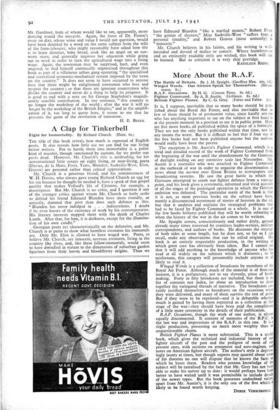A Clap for Tiukerbell
Eight for Immortality. By Richard Church. (Dent. 6s.) THE title of this book reveals how much is expected of English poets. It also reveals how little use we can find for our living minor writers. For to hustle them into immortality is a polite kind of murder, though sanctioned by custom, for we prefer our poets dead. However, Mr. Church's title is misleading, for his conversational little essays on eight living, or near-living, poets (Davies, de la Mare, Frost, Yeats, Blunden, Sackville-West, Eliot, Graves) are personal rather than critical appreciations.
Mr. Church is a generous friend, and his reminiscences of W. H. Davies, who always gave young Richard Church an egg for his tea because he thought he needed it, have a spark of that gospel quality that makes Vollard's life of Cezanne, for example, a masterpiece. But Mr. Church is no critic, and I question if any of the younger critics against whom Mr. Church so hotly seeks to defend his friend Edmund Blunden have more roundly, or unjustly, damned that poet than does such defence as this. "Blunden has never indulged in . . . indiscretions. I doubt if he even knows of the existence of work by his contemporaries. His literary interests stopped short with the death of Charles Lamb. After that, for him, it is darkness, except for the illumina- tion of his own candle."
Georgian poets are characteristically on the defensive, and Mr. Church is at pains to show what harmless creatures his immortals are. Only Mr. Eliot is allowed to have waged war. Poets, to believe Mr. Church, are innocent, nervous creatures, living in the country like elves, and, like these fellow-inunortals, would seem to have dwindled in stature to the dimensions of suburban garden figurines from their heroic and bloodthirsty origins. Thus we have Edmund Blunden "like a startled mouse," Robert Frost "the genius of shyness," Miss Sackville-West "suffers from a personal timidity," and Robert Graves (most unmanly) is "innocent."
Mr. Church believes in his fairies, and his writing is well. intended and devoid of malice or conceit. Where harmlessness and an eminently readable style are wished, this book will not be banned. But as criticism it is very thin porridge.
KATHLEEN RA1NE.


























 Previous page
Previous page